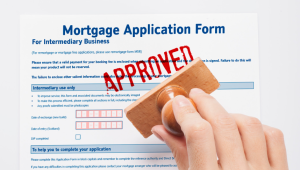Are you planning to buy your dream house in the UK? If so, then one of the most important things you need is a mortgage loan. A mortgage loan can be a complex process, but with the right information and guidance, it can be straightforward. In this ultimate guide, we will take you through everything you need to know about getting a mortgage loan in the UK. From understanding what mortgage lenders are looking for to preparing for the application process, we have got you covered. We will also explore how your credit score affects your chances of getting approved for a mortgage loan and the key factors that lenders consider before making a decision. So, let’s dive in and get started on your journey towards homeownership!
What is a Mortgage Loan?

A mortgage loan is a type of loan that is used to finance the purchase of a property. It is a secured loan, meaning that the property itself serves as collateral for the loan. When individuals or families want to buy a home but do not have sufficient funds to pay for it outright, they can apply for a mortgage loan from a lender such as a bank or financial institution. The lender will assess the borrower’s financial situation and creditworthiness to determine if they are eligible for a mortgage loan.
If approved, the borrower will receive a lump sum of money from the lender, which they can then use to purchase the property. The borrower will then repay the loan over time, typically in monthly instalments plus interest. If the borrower fails to make their mortgage payments, the lender has the right to foreclose on the property and sell it in order to recoup their losses.
Types of Mortgages Available in the UK

Several types of mortgages are available in the UK to suit different financial situations and preferences.
- Interest-only mortgage: With an interest-only mortgage, you only repay the interest on the loan each month. The capital sum remains outstanding throughout the term of the mortgage. At the end of the mortgage term, you will need to find a way to repay the capital sum in full.
- Repayment mortgage: With a repayment mortgage, you repay both the interest and capital each month. This means that over time, your debt reduces as you make regular payments. At the end of the term, your debt will be cleared completely.
- Fixed-rate mortgage: A fixed-rate mortgage has an interest rate set for a specific period, usually between two and five years. This means that your monthly payments will stay the same during this time, regardless of any changes in the wider market.
- Variable-rate mortgage: A variable-rate mortgage has an interest rate that can change over time, in line with movements in the wider market. This means that your monthly payments could go up or down depending on market conditions.
What Are Mortgage Lenders Looking For?

When it comes to applying for a mortgage, it’s important to understand what lenders are looking for. Mortgage lenders want to ensure that borrowers have the ability to repay their loans. To determine this, they will typically look at several factors, including credit score, income stability, employment history, and debt-to-income ratio.
A good credit score is important as it demonstrates a borrower’s ability to manage debt responsibly. Lenders will also want to see a stable income and employment history, as this shows that the borrower has a reliable source of income. Also, lenders will assess the borrower’s debt-to-income ratio, comparing their monthly debt payments to their gross monthly income. Overall, mortgage lenders are seeking borrowers who are financially responsible and have the means to repay their loans.
Preparing for the Mortgage Loan Application Process

The mortgage loan application process can be daunting, but preparing for it in advance can help make the process smooth and stress-free. Here are some tips on how to prepare for the mortgage loan application process:
- Know Your Credit Score: Your credit score is one of the most important factors in determining whether or not you will be approved for a mortgage loan. Be sure to check your credit score in advance so that you know where you stand.
- Have Your Documentation Ready: When you’re ready to apply for a mortgage loan, you’ll need to have all of your financial documentation in order. This includes things like your tax returns, pay stubs, bank statements, and more. Having everything organized and ready to go will help make the application process go much smoother.
- Shop Around for the Best Rate: Don’t just go with the first mortgage lender you find. Be sure to shop around and compare rates from different lenders before making a decision.
- Get Pre-Approved: Getting pre-approved for a mortgage loan is a good way to know how much money you’ll have to work with when buying a home. It’s also a good way to show sellers that you’re serious about buying their home.
- Know What You Can Afford: One of the most important aspects of taking out a mortgage loan is knowing how much you can realistically afford to borrow. Be sure to take into account your income, expenses, and other financial obligations when determining your budget.
How to Get a Mortgage Loan in the UK?

To get a mortgage loan in the UK, you’ll generally need to follow these steps:
- Decide if you want to use a broker to explore your options for a UK mortgage.
- Choose a bank with a mortgage that suits your needs.
- Hand over the paperwork requested and get an offer in principle.
- Find a property within your budget and agree on a purchase price with the seller.
- Complete the full mortgage application process.
- Wait for the lender to approve your application.
- Get a survey done on the property you want to buy.
- Exchange contracts with the seller.
- Complete the purchase of the property.
Foreigners, both resident and non-resident, can legally buy property and obtain a mortgage in the UK. However, for non-residents and non-EU/EFTA nationals, the process for mortgages in the UK can be a bit more complicated. It’s a lot easier to get a mortgage in the UK if you have been a UK resident for at least two years.
How Does Your Credit Score Affect Your Mortgage Loan?
Your credit score plays a significant role in determining your eligibility for a mortgage loan. Lenders use your credit score to assess your creditworthiness and determine your loan’s interest rate and terms. A higher credit score indicates that you are financially responsible and more likely to repay your loan on time, which can result in a lower interest rate and better loan terms.
On the other hand, a lower credit score may lead to higher interest rates or even disqualification for a mortgage loan. Maintaining a good credit score is important to paying bills on time, keeping credit card balances low, and avoiding excessive debt. By doing so, you can increase your chances of securing a favourable mortgage loan.
Key Factors Mortgage Lenders Consider

When applying for a mortgage, lenders will consider several key factors before approving your loan.
1. Income Stability
To ensure a successful mortgage loan application in the UK, it is important to demonstrate income stability. Lenders want reassurance that you have a stable source of income and can repay the loan. To do this, provide proof of your income through employment history, pay stubs, or tax returns. Show consistent earnings and avoid frequent job changes as it instils confidence in lenders.
Additionally, highlight any additional sources of income you may have, such as rental properties or investments. If you have any gaps in your employment history, prepare explanations to address potential concerns. An effective approach is to consult a mortgage broker who can help you explore loan options catering to irregular income sources. Focusing on income stability increases your chances of securing a mortgage loan in the UK.
2. Debt-to-Income Ratio
Discussing your debt-to-income ratio with a loan officer will help you understand its impact on your mortgage loan approval. Demonstrating a low debt-to-income ratio increases your chances of securing a home loan. Remember, different loan types have varying guidelines on debt-to-income ratios, so it’s essential to consult with your lender or mortgage broker to understand the specific requirements. Understanding and managing your debt-to-income ratio is critical in obtaining a mortgage loan.
3. Down Payment Capability
To demonstrate your commitment to the mortgage loan, saving for a down payment is crucial. Different lenders and loan programs have varying minimum down payment requirements, so it is essential to understand them. Explore options for down payment assistance or grants from government or nonprofit organizations. Additionally, you can consider using gift funds from family members towards your down payment, ensuring you follow the lender’s guidelines. It is advisable to consult with a mortgage broker to explore loan options with flexible down payment requirements. Remember, down payment capability is integral to the mortgage loan process.
What are the Benefits of Getting a Mortgage Loan in the UK?

Getting a mortgage loan in the UK can offer several benefits for individuals looking to purchase a property. One of the main advantages is that it allows you to become a homeowner without needing to pay the full purchase price upfront. Instead, you can spread the cost over a longer period of time, making it more affordable and manageable.
Additionally, mortgage loans often come with lower interest rates compared to other types of loans, making them a cost-effective option for financing your home. Moreover, by making regular mortgage payments, you are building equity in your property, which can be a valuable asset in the long run.
Lastly, having a mortgage loan can also provide certain tax benefits, such as deducting mortgage interest from your taxable income. Overall, getting a mortgage loan in the UK can be a smart financial move for those looking to own their own home.
Conclusion
In conclusion, getting a mortgage loan in the UK requires careful preparation and understanding of the process. It is important to assess your financial health, build your savings, and have a good credit score to increase your chances of approval. When reviewing loan applications, mortgage lenders consider factors such as income stability, debt-to-income ratio, and down payment capability. By being proactive and taking the necessary steps to strengthen your financial position, you can improve your chances of securing a mortgage loan that suits your needs. Remember, the mortgage application process may seem daunting, but you can navigate it successfully with the right guidance and preparation.









